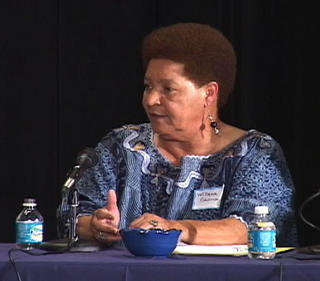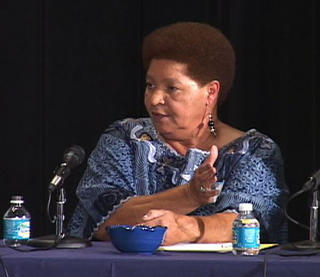Willena Cannon, a member of the CWP in 1979 who arrived on the scene after the shooting and was arrested there. Involved since 1963 in the Civil Rights Movement, she has participated in the African Liberation Movement, the Blind Workers Strike, the Cafeteria Workers Strike, the K-Mart boycott and the struggle for district representation on the City Council. She currently works as community housing organizer for the Greensboro Housing Coalition.
"It was a festive mood, and a lot of people. And believe me, there was a lot of community people there. It wasn't just CWP... they couldn't come forward. I mean, people were scared to come forward. And there was a good reason for that, 'cause a lot of times you may lose your job, a lot of things would happen to you, so people kept quiet. But it wasn't just CWP. It was the community."
"I never did get down. I could see at the end that vans were stopped, and people were laying in the street. Pretty soon I heard Nelson. And then I went over where Jim Waller was laying down - face down - and Nelson turned him over and he kind of had his head on my knee, and he was bleeding. When I went to jail later, I had his blood all over my pants. I actually saw that Jim was alive, and then I saw the light go out of his eyes, and that he was dead, and Nelson was talking to him."
"Then I saw Paul, and I thought - big eyes, something - he was shaking, and then I saw - just seeing the surroundings. I never did see Sandi. I found out later she was behind the building."
"And then I heard Nelson. He was telling the people that this whole thing was a set up, and what he felt about it. And knowing the years that police always would be on Nelson, or really kinda -- they went for him, most of the time. So I ran around to where he was, and he was telling people what was going on. And then the police crowded in. Actually, one had him down on the ground with their boot against his neck, and was pulling on him. And all I could think was 'Oh my God, they're gonna break his neck right here.'"
"And I could hear the paper saying later that he was acting wild or whatever and he broke his neck, and I could think about all of that. The guys around this whole thing, the people from that neighborhood, didn't like what was going on, and they were saying stuff, but they weren't moving to stop it or get involved. So actually I just jumped in on the police. I knew these black men would not let the police handle me. And once I jumped in, they were handling me, and then these guys started coming in, they were moving in, and the police was forced to stop it because of that. And that stopped that whole scene right there."
"And then they said we were arrested. I asked him why was I arrested, and he said 'Oh we don't know why, but we'll think of something by the time we get there.'"
 "And I was put into a car, and carried - not to jail, I went down in the police station in the basement, and they were trying to get me to answer, asking me what was my name, and I told them 'Look, you know what happened, because you were involved in some of it, you knew what was going on.' So they said, 'Look Willena, if you don't tell us, answer our questions, we can't help you.' And I said, 'Well, you know my name already.'"
"And I was put into a car, and carried - not to jail, I went down in the police station in the basement, and they were trying to get me to answer, asking me what was my name, and I told them 'Look, you know what happened, because you were involved in some of it, you knew what was going on.' So they said, 'Look Willena, if you don't tell us, answer our questions, we can't help you.' And I said, 'Well, you know my name already.'""When we were coming to the police station, a female policeman said, 'Oh, I think there was children killed too.' And I remember that at least my son and other people's children, neighborhood children, lots of children was there. And all I could think of was, was children killed?"
"And after that I saw people - people hiding, and people were scared. People that I've been knowing all my life were scared to be around us. My family... [pause] to me it was... [breaks off]. I'm so sorry. It just took me back to years in South Carolina. Not just the Klans. The police, the Mayor, the Klans, over - for years - over and over. This was 1979. And this is still happening. And I was naive enough to believe I was in the North."
"The Klan said they were protecting themselves. How is shooting a man in the back, running away from the scene, can be considered as proportional self-defense? I mean, how do you kill somebody running away from you, and you're defending yourself? These to me are some serious questions."
"I've been watching in Greensboro since 1963, and the police never would leave you alone, whether you wanted them there or not. They were there, all the time. This is the first time I've ever been to a rally where there were no policemen there. They were there, and then they were sent away for lunch."
"A police informant - a Klansman - was given a copy of the parade or march permit. The question is why? What for? What did he need it for? Why would the police department give a Klansman a copy of the permit? That's one question the D.A. never asked."
"After [D.A. Mike Schlosser] talked about that Communists in Vietnam was the enemy that he fought against, and that the American people hated Communists, and then have him to be the person that's gonna protect you? And he also said that charges may be brought against some protestors. So to me, that was a legal lynching right there that I didn't want any parts of. So that's why I didn't participate in that [first trial], and I don't regret that decision today; especially some of the things that have come out since. And especially Judge Long was the person that was conducting that... if he thinks that Klans shooting was calming shots, and guns are part of a uniform, that tells me a lot about Judge Long and not being a part of his courtroom. I felt safer not being part of it. I might be in jail today had I been a part of it."
 "My sister was the Director of St. James Day Care Center. And when Nelson was arrested, she was afraid that they were gonna do something to him. So when they let him out the next day, she stopped her car almost in the middle of the street and ran up and hugged him. She was glad to see him, and tears was running down her face. And the newspaper took that picture, and it was taken to her boss, and saying that he had to fire her. I'm not sure who, but that was a big problem."
"My sister was the Director of St. James Day Care Center. And when Nelson was arrested, she was afraid that they were gonna do something to him. So when they let him out the next day, she stopped her car almost in the middle of the street and ran up and hugged him. She was glad to see him, and tears was running down her face. And the newspaper took that picture, and it was taken to her boss, and saying that he had to fire her. I'm not sure who, but that was a big problem.""Anybody around you, they were villains, or they got dealt with, or they were afraid that they would be dealt with. When I went back into Morningside, people said 'Look I believe in what you're doing. I've known you for years, but I'm scared. Please don't come now, come another time. I gotta go. I'm scared.' I got that from people I've been knowing for years. And the thing is, it hurt, but I understood it. Because they were dealing with me, I knew they'd be dealing with them too."
"It was a nightmare for our children. My son Kwame started going into people's houses, and he was sent to jail. He was under the impression that once he was caught - he went into six people's houses, no guns, no nothing, and just turned 17 - that was wrong, so I'm not trying to say it was right, but he was under the impression that he might have to make a couple of months once he was caught. Because, he said, 'the Klans killed people, and they didn't make no time.' He really learned the reality when they gave him two life sentences."
"The fact that we went to China Grove to confront the Klans - people always tell me, 'the Klans have a right to show the Birth of a Nation, that's their right, why would you stop their rights?' Me, as a black person, don't I have a right to protest showing hanging and lynching of black people? Where's my right? I'm 65 years old, and I'm sorry. If the Klans show that crap tomorrow, I'll be there."
No comments:
Post a Comment